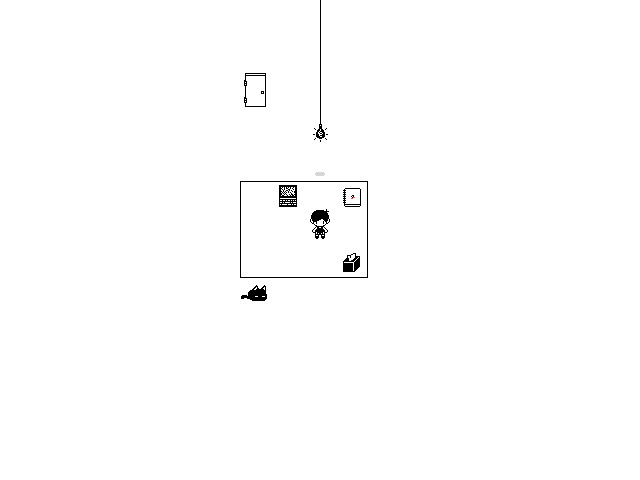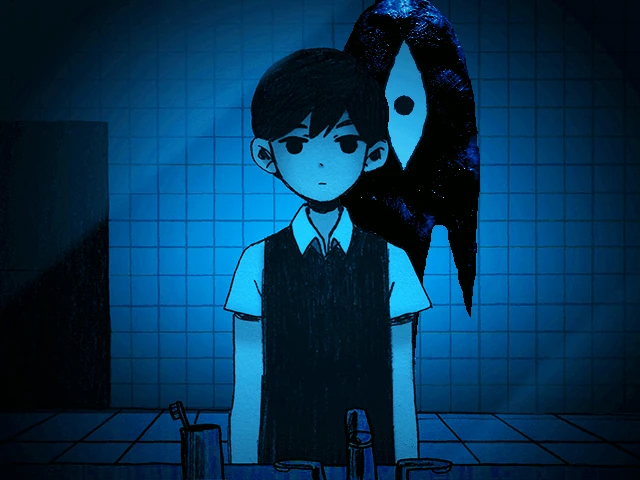Strange Gaming Diaries: OMORI, by OMOCAT
just a heads-up, because OMORI is a game that relies heavily on twists and surprises, I can't really get away with keeping the spoilers isolated to the spoilerzone if I want to effectively talk about what I wanna talk about. so I'm just gonna plaster a spoiler warning over this whole diary entry!

back when OMORI released in 2020, I was dimly aware of the game but kept a healthy distance—I didn't have the money to get the game, wanted to take its content warnings seriously, and also wanted to wait for the manic fandom hype around it to die down a little bit so I could play it with a clear head. I'm glad I did this, because it's only at this point in my life and without background noise of quite that volume that I could feel confident saying that OMORI left me feeling kind of frustrated.
now, I'm no stranger to RPG maker games about mental illness, and I think it can be reasonably said that OMORI is quite possibly the apex of this particular sphere of games. it's bigger in scope than any of its contemporaries, it's a solidly designed and pretty fun RPG in its own right, and it's generally the kind of work where the effort and passion put into it is fully on display throughout the whole experience. whatever else I'm about to say about OMORI, I cannot deny that this game is absolutely beautiful, and that I was enjoying playing it from start to finish. it's a special kind of game that I'm very happy gets to exist.
but the thing about OMORI is that it's obviously a game that is meant to tear out your heart and make you cry, to take you on its emotional roller coaster. the game's horrific, humorous, tragic, and hopeful moments are all carefully laid out to get you emotionally invested and use that emotional investment to hit you where it'll leave a mark. and I, being the trumatized, chronically depressed, terminally sheltered, dissociative young adult that I am, feel like I'm square in the middle of the target audience here! I have pretty much all of the things everyone talking about this game says that the game does a really good job of portraying!
so why didn't I feel anything?
that's not to say that I played through the entire game stonefaced and silent. the dialogue was often charming, the boss fights pulse-pounding, and the horror elements surprisingly effective. but that's it, really—I was playing through the game admiring the craftsmanship of the thing moreso than I was actually feeling like that craftsmanship was creating something that actually mattered to me. I played OMORI and had a really good time, and even came out of it with a few really interesting concepts, but looking back I struggle to relate myself to an experience that clearly wanted me to relate to it. does that mean the game failed?
I don't think so. in fact, I think OMORI succeeded near-perfectly in being the exact kind of thing it wanted to be—but I think the story's foundational aspirations are where it had already lost me.
to help illustrate the point I'm about to make, I want to tell you about my experiences with naruto. bear with me, I promise it's relevant!
I watched through the entirety of the anime's original series with my girlfriend at the time, and experienced a profound sense of apathy towards everything I'd taken in. I was invested on an immediate, reflexive level because the fights kicked ass, but after it was all said and done I was struck by just how little it mattered to me in any way beyond that, because I found it impossible to relate myself to characters that the story insists on loading with cartoonishly overwrought traumatic backstories. naruto is a series that doesn't feel interested in any meaningful exploration of its characters' backstories and their responses to and relationship with that trauma, instead just repeatedly bludgeoning its audience with the most obviously fucked up and awful shit the writer can think in the hopes that it'll make their characters that much more edgy and cool.

OMORI, obviously, is much more competent and deliberate with its use of trauma as a character element than this. but, ultimately, its story also follows this exact model of "what if the most horrible thing you can imagine happened to this teenage boy" and presents nearly every challenging element of the game as relating directly back to mari's death. when the game talks about repression, it is specifically talking about repressing the memory of mari's death. when the game talks about guilt, it is specifically talking about sunny and basil's feelings of culpability for mari's death.
and like...that's not always how mental illness works? that's not even always how trauma works.
at the risk of perhaps getting a bit autobiographical here, I've been dealing with trauma and mental illness for pretty much my entire life, but like...at no point did a single fucked up awful thing ruin my life. my circumstances were just shitty, abusive, and isolating in a very passive way that gradually built up to the extremely debilitating conditions that I have to deal with.
and so I constantly found myself bouncing off of OMORI's story, because even when it does have interesting things to say about social isolation and how it destroys you as a person, or being intensely disconnected from your waking life, or feeling as though your own mind is punishing you for the things you've done, these things are rarely ever presented in any context outside of mari's death. I can't shake the feeling that there's something reductive about the way OMORI presents its themes, how it funnels all the myriad complications of trauma and self-harm into a single point so that the story can be wrapped up in a nice, unproblematic little bow and pushed out into the world to receive endless praise for its innovative portrayal of mental illness. the fandom fawns over their wholesome little blorbos, people put out hours-long video essays repeating what the game was already obviously saying about its own themes, and time continues to be a flat fucking circle.
I want to like OMORI. that a game this ruthlessly explicit about mental illness and uncompromised in its artistry has gotten this much attention does inspire a kind of hope, and there is something genuinely special here, it does do things that are surprisingly nuanced and thoughtful for a game with this kind of visibility. when exploring black space, I found myself struck by the callous cruelty of basil's many deaths, and especially the one that comes at the hands of images of aubrey, kel, and hero. there's almost a fixation in how incessant and relentless it is, like there's part of sunny's mind that creates grisly scenes of death and murder involving his loved ones over and over again, smashing reconstructions of these real people together like they're just figures to be inconsequentially played with. this theme even seems to be reinforced by the black space area you enter immediately before this one, called "INCUBATION" in the game's files and featuring blank-faced copies of sunny's friends seemingly being birthed in infinite copies. there's something to be said there about how dissociation can make the people around you feel less real, and promotes unhealthy thought patterns that passively dehumanize them in your own head.
also there's the fact that there's still goofy shit in black space, which is billed as the most terrible no-good horror-game part of the horror game! you can ask loquacious cat if cereal is a soup and it'll tell you "TWO YARDS OF LEATHER"! there are dancing skeletons whose only line of dialogue is "Dance, skinboy!" there's a sprout mole version of omori called "omoli" who asks you for money and you can give him a twenty dollar bill from the literal sea of twenty dollar bills that's also in black space and he'll tell you "Thabks..." (yes that's spelled wrong on purpose) and instantly dematerialize! the fact that some of the funniest and most out-of-pocket shit in the game is rubbing shoulders with parts so horrible I legitimately can't even look at them because of how high they make my anxiety spike is so interesting, and does a lot to demonstrate not only how much weirder and more uncomfortable you can make an experience by injecting humor into it, but also the extent to which those elements coexist in the mind.
but ultimately, these are only glimpses of nuance and thoughtful ideas as seen lingering beneath the game's main focus on this tidy and clean narrative it feels the need to tell. it's beautiful and heartfelt, but reveals an incurious and banal foundation once the dust settles. it's the exact kind of indie game (derogatory) that comes out of the woodwork every so often and convinces people that nothing like it has ever been done when there are countless games that are far braver in the risks they take.
it was so close, so unbelievably close to being the exact kind of masterpiece I wanted to see, and—if you'll allow me a brief moment of dramatic exaggeration—I came out of it feeling something like betrayal. even with all the other things worth admiring, OMORI is never going to escape that for me.
buy the soundtrack on bandcamp!
OMOCAT's website!
check out slime girls' music on bandcamp!
check out clover & sealife's music on bandcamp!
archeia's website!
ems's website!
website of whitney white's two-person company, white guardian studios!
minced's website!
bluemoon's itch.io page!
cachi córdova's itch.io page!
Comments
note: these comments are manually moderated, so they have to go through me before they become visible!